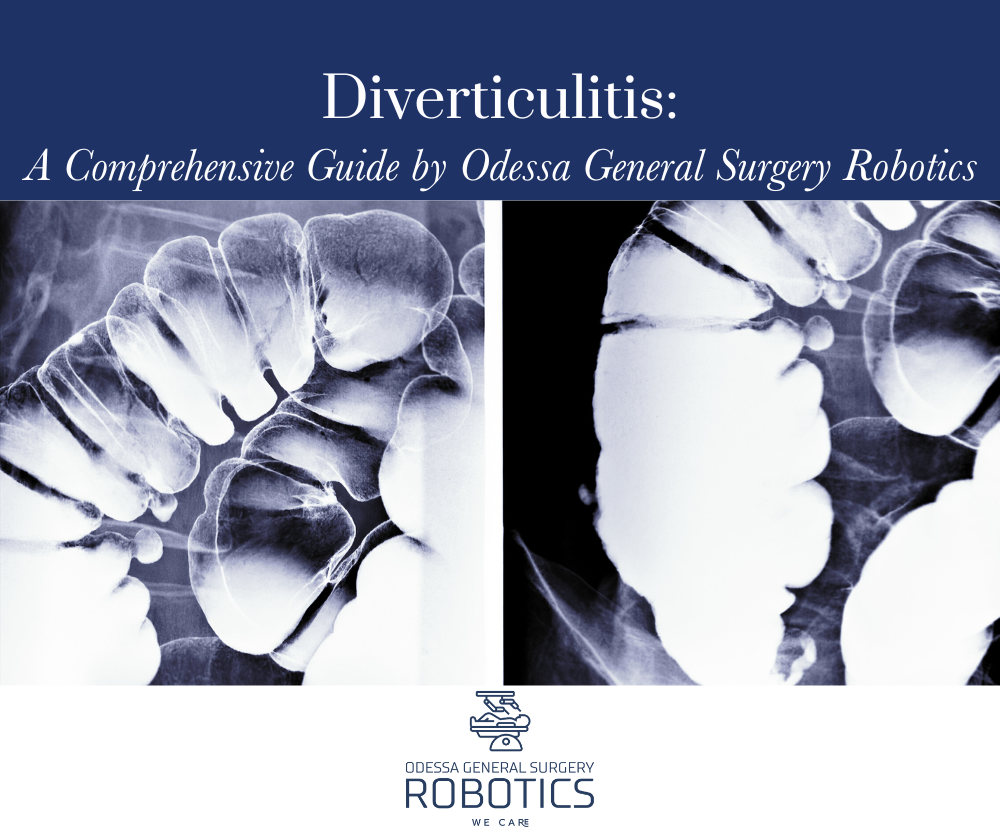 Diverticulitis is a condition that affects the digestive tract, often causing significant discomfort and potentially leading to severe complications if left untreated. At Odessa General Surgery Robotics, we specialize in advanced, minimally invasive treatments for diverticulitis, aiming to provide our patients with the best possible outcomes and a swift return to their everyday lives. This comprehensive guide will explore what diverticulitis is, its symptoms, causes, treatment options, and how robotic-assisted surgery can be a game-changer in managing this condition.
Diverticulitis is a condition that affects the digestive tract, often causing significant discomfort and potentially leading to severe complications if left untreated. At Odessa General Surgery Robotics, we specialize in advanced, minimally invasive treatments for diverticulitis, aiming to provide our patients with the best possible outcomes and a swift return to their everyday lives. This comprehensive guide will explore what diverticulitis is, its symptoms, causes, treatment options, and how robotic-assisted surgery can be a game-changer in managing this condition.
What is Diverticulitis?
Diverticulitis occurs when small, bulging pouches (diverticula) that can form in the lining of the digestive system become inflamed or infected. These pouches are most commonly found in the lower part of the large intestine (colon). The presence of diverticula is called diverticulosis, which is generally harmless. However, when these pouches become inflamed or infected, it leads to diverticulitis, which can cause severe abdominal pain, fever, and changes in bowel habits.
Symptoms of Diverticulitis
The symptoms of diverticulitis can range from mild to severe and may include:
- Abdominal pain: Often located on the lower left side, but can occur on the right side in some cases.
- Fever: A sign of infection.
- Nausea and vomiting: Often accompany severe abdominal pain.
- Changes in bowel habits: Including constipation or diarrhea.
- Bloating: A feeling of fullness or swelling in the abdomen.
- Loss of appetite: Due to discomfort and digestive issues.
In severe cases, diverticulitis can lead to complications such as abscesses, perforation of the colon, peritonitis (infection of the abdominal cavity), fistulas (abnormal connections between organs), and intestinal obstruction.
Causes and Risk Factors
The exact cause of diverticulitis is not entirely understood, but several factors may contribute to its development:
- Age: The risk increases with age, especially after 40.
- Diet: A low-fiber diet can lead to constipation and increased pressure in the colon, contributing to the formation of diverticula.
- Lack of Exercise: Physical inactivity is associated with a higher risk of diverticulitis.
- Obesity: Being overweight increases the likelihood of developing diverticulitis.
- Smoking: Tobacco use has been linked to an increased risk of diverticulitis.
Diagnosis
Diagnosing diverticulitis typically involves a combination of medical history review, physical examination, and diagnostic tests such as:
- CT Scan: The most common and accurate test for diagnosing diverticulitis, a CT scan can show inflamed or infected diverticula and complications such as abscesses.
- Blood Tests: These can help detect signs of infection or inflammation.
- Stool Tests: To rule out other causes of abdominal pain and symptoms.
Treatment Options
The treatment for diverticulitis depends on the severity of the condition:
- Mild Cases: Mild diverticulitis can often be treated with rest, a liquid diet, and antibiotics.
- Moderate to Severe Cases: More serious cases may require hospitalization, intravenous antibiotics, and possibly drainage of abscesses.
- Surgical Intervention: Surgery may be necessary if there are complications, colon perforation, recurrent attacks, or if other treatments are ineffective. This can include removing the affected portion of the colon (colon resection).
Robotic-Assisted Surgery for Diverticulitis
At Odessa General Surgery Robotics, we utilize state-of-the-art robotic-assisted surgical systems to treat diverticulitis. This advanced technology offers several benefits over traditional open surgery and even conventional laparoscopic surgery, including:
- Minimally Invasive: Smaller incisions lead to less pain, reduced scarring, and a faster recovery.
- Precision and Control: Robotic systems provide enhanced precision, flexibility, and control, allowing surgeons to operate with greater accuracy.
- Reduced Complications: The advanced visualization and dexterity offered by robotic systems help minimize the risk of complications.
Recovery and Prevention
Post-surgery, recovery typically involves a short hospital stay and a gradual return to normal activities. To prevent future episodes of diverticulitis, it is essential to adopt a healthy lifestyle, which includes:
- High-Fiber Diet: Consuming plenty of fruits, vegetables, and whole grains to keep the digestive system healthy.
- Regular Exercise: Physical activity helps maintain bowel regularity and reduce pressure in the colon.
- Hydration: Drinking enough water to prevent constipation.
- Avoiding Smoking: Quitting smoking to improve overall digestive health.
Conclusion
Diverticulitis can be a challenging condition to live with, but with the right treatment and lifestyle changes, it is manageable. At Odessa General Surgery Robotics, we are committed to providing the highest quality care using the latest in robotic-assisted surgical technology. If you or a loved one is experiencing symptoms of diverticulitis, don’t hesitate to contact us for a consultation. Our team of experienced surgeons is here to help you achieve better health and a better quality of life.
For more information or to schedule an appointment, visit our website or call us today. Together, we can take the first step towards a healthier, pain-free life.
